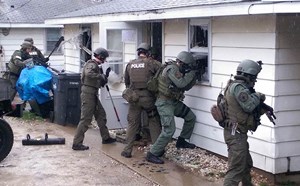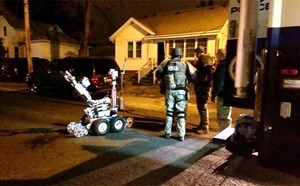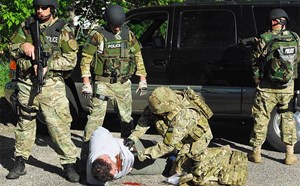
EM Residencies and Fellowships with TacMed Components
Augusta University
Augusta, GA
Learn More
Contact: Center of Operational Medicine
Email
Atrium Health (Formerly Carolinas HealthCare System)
Charlotte, NC
Learn More
Contact: Elizabeth Shelton, MLIS
Program Coordinator
Center for Prehospital Medicine
Email
Cleveland Clinic – Akron General
Akron, OH
Learn More
Program Director
Email
Einstein Healthcare Network
Philadelphia, PA
Learn More
Hennepin County Medical Center
Minneapolis, MN
Learn More
Contact: Mary Hirschboeck
Residency Coordinator
Email
Johns Hopkins University
Baltimore, MD
Learn More
Contact: Nelson Tang, MD, FACEP
Vice Chair for Operational Medicine
Associate Professor
Division of Special Operations, Department of Emergency Medicine
MetroHealth
Cleveland, OH
Learn More
Contact: Jeffrey Pennington, MD, FACEP
State University of New York
Syracuse, NY
Learn More
Contact: Lisa Williams
Fellowship Coordinator
Email
University of California – Fresno
Fresno, CA
Learn More
Contact: Megann Young, MD, FACEP
UCSF Fresno Emergency Medicine Residency Program
Email
University of Cincinnati
Cincinnati, OH
Learn More
University of Connecticut
Farmington, CT
Learn More
Contact: Rich Kamin, MD, FACEP
Assistant Professor
State of Connecticut EMS Director
Medical Director, Ground EMS, John Dempsey Hospital
Associate Medical Director, LIFE STAR
University of Florida
Gainesville, FL
Learn More
Contact: John H Slish, MD, FACEP
UF EMS Fellowship Co-Assistant Director
Clinical Assistant Professor of Emergency Medicine
Assistant Medical Director of Gainesville Fire Rescue
Medical Director of Tactical Medicine Gainesville Fire Rescue
SWAT Team Physician for Gainesville Police Department and ACSO
Email
University of Illinois College of Medicine at Peoria (UICOMP)
Peoria, IL
Learn More
Contact: John Wipfler, MD, FACEP
Email
University of New Mexico
Albuquerque, NM
Learn More
Contact: Sandra Mirabal, Residency Coordinator
Department of Emergency Medicine
Email
University of South Florida
Tampa, FL
Learn More
Contact: Catherine Carrubba MD, FACEP
1 Davis Blvd, Suite 504
Tampa, FL 33606
Email
University of Pittsburgh
Pittsburgh, PA
Learn More
Contact: Ronald N. Roth, MD, FACEP
Chief, Division of EMS
Director, EMS Fellowship
Email
Wake Forest University School of Medicine
Winston-Salem, NC
Learn More
Contact: William (Bill) Bozeman, MD, FACEP
Professor, Director of the Office of Prehospital Research
Director of Forsyth County’s Tactical Medicine Team
Email
Weill Cornell Medical College
Lincoln Medical and Mental Health Center
New York City, NY
Learn More
WellSpan York Hospital
York, PA
Learn More
Dayton, OH
Learn More
Contact: Brian L. Springer, MD, FACEP
Assistant Professor
EMS Director
Division of Tactical Emergency Medicine
Wright State University
Dept. of Emergency Medicine
Email
Additional Resources:
Resident involvement in tactical medicine.
J Emerg Med. 2008 Apr;34(3):338-9. Epub 2007 Aug 29.
Bozeman WP, Blankenship SB, Winslow JE.
Letter to the Editor
Resident Involvement in Tactical Medicine
To the Editor:
In recent years there has been a surge of interest in tactical medicine: the provision of medical support to law enforcement and military tactical teams (1, 2, 3, 4, 5 and 6). Providers of tactical medicine include paramedics as well as physicians and other medical personnel. The most common image of tactical medicine involves “care under fire” or initiating treatment of a gunshot victim while a battle still continues. However, this image is misleading; tactical medicine is much more than standard prehospital trauma care adapted to a special circumstance or situation. In reality, it includes the comprehensive medical support of tactical teams during training and missions and incorporates elements of primary care, health maintenance, preventive medicine, sports medicine, and toxicology as well as prehospital emergency medical services (EMS). Many of these aspects are beyond the scope of paramedic training and necessitate the active involvement of physicians with expertise in tactical medicine. Additional knowledge and skills from outside the world of medicine are also necessary for all levels of providers, including tactics, protective equipment, evidence protection, forensics, and weapons safety.
Although tactical medicine has been pioneered by physicians from several specialties, the majority of tactical physicians are emergency physicians with expertise in EMS and additional experience and training in tactical operations. Current resident physicians in emergency medicine training programs will become the future practitioners of this emerging area of concentration in emergency medicine.
To assess the level of resident physician exposure to and involvement in tactical medicine, we conducted an e-mail survey of all 132 emergency medicine (EM) residency programs in early 2005. We received responses from 104 programs (79%). We found that 19 of the responding residencies (18%) currently offer their resident physicians exposure to or involvement in tactical medicine. Three additional programs (3%) expressed plans to involve resident physicians in their existing tactical medicine programs.
Resident participation is voluntary in 18 of the programs (95%) and required as part of an EMS rotation in one program. Resident physicians are most commonly involved in education of tactical team members or tactical medics (88% of programs), providing care at tactical team training (88% of programs) and callouts (76% of programs). Training requirements include physical qualifications (41%) and specific mandatory training (47%), which is highly variable, ranging from reading and didactics to formal law enforcement training. Additional optional training is available to interested residents at most programs (76%). Three programs allow qualified residents to carry firearms after training and certification as police officers, whereas the remaining 16 programs specifically prohibit this. In all programs (100%), resident physicians are closely supervised by attending physicians with specialized training in tactical medicine.
We found that EM residencies and residents are becoming involved in the emerging field of tactical medicine. A significant minority of EM residencies, approximately one in five, currently offers exposure to tactical medicine to their residents. Those that do are characterized by voluntary participation of residents under close supervision by attending physicians. Residents receive specialized medical and police training to provide education and medical care. There is wide variability among programs in training requirements and levels of involvement of resident physicians. A similar survey performed in 2003 suggested that 23 of 82 responding EM residencies offered some form of resident involvement in tactical medicine (7). However, that report focused on attitudes toward tactical EMS and did not characterize the degree or nature of resident involvement.
This survey provides a “snapshot” of the current status of resident physician involvement in tactical medicine and complements previous work. It can be used as a baseline to measure future growth in the field and may help guide current and future residents with a particular interest in this area of concentration. It may also assist other residency programs that are interested in involving their residents in tactical medicine by confirming that numerous other programs have already successfully addressed the associated logistic and administrative issues.
William P. Bozeman, MD, FACEP
Professor, Director of Prehospital Research
Dept. of Emergency Medicine
Wake Forest University School of Medicine
wbozeman@wakehealth.edu



